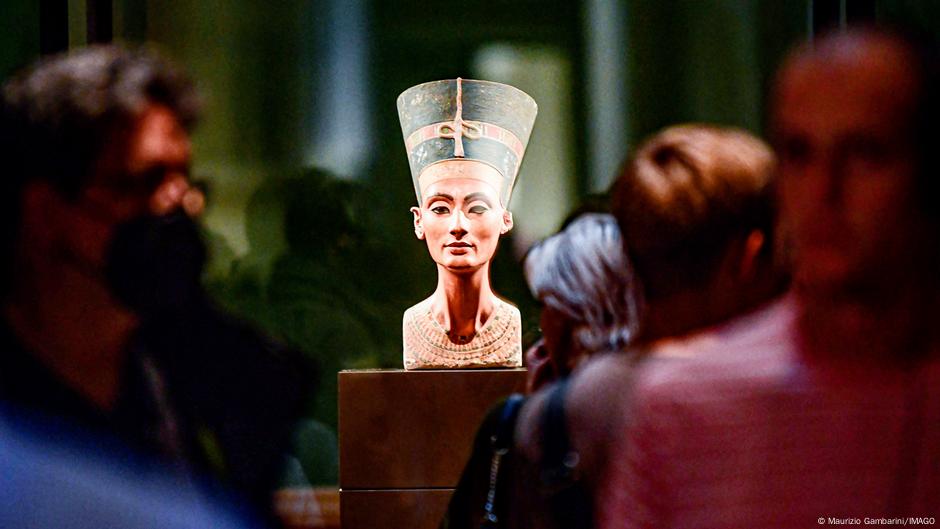She is an enduring global symbol of beauty, power and mystery who has fascinated Hitler, Beyonce and Arab Spring activists alike: Queen Nefertiti, whose name translates to “the beautiful one has come,” is one of the most iconic figures of the ancient world.
The Great Royal Wife of Pharaoh Akhenaten — who radically transformed religion by promoting the worship of the single sun god, Aten — ruled more than 3,300 years ago. But Nefertiti’s current fame is largely due to the discovery of a painted stucco-coated limestone bust in 1912 by a German team led by Ludwig Borchardt.
The bust was then brought to Berlin. Today, it is “the undisputed star of the Neues Museum,” as stated on the website of the Prussian Cultural Foundation, which oversees the collection of the museum, which is part of the UNESCO-listed .
Growing calls for restitution
Restitution claims for the bust began shortly after its discovery. Now, with the opening of the in Cairo, the calls are gaining momentum.
Visitors on tours at the Grand Egyptian Museum are being asked to sign a petition by Egypt’s former Minister of Tourism and Antiquities, Zahi Hawass.
“Despite many ignored calls for meaningful dialogue as well as requests for acknowledgment of how this unique artifact ended up in Germany, this petition today is meant to re-ignite that conversation, inspire the return of the bust to Cairo, and elicit a dignified response from German authorities,” states the petition, which calls on the German culture minister and the Prussian Cultural Heritage Foundation to deal with the matter.
A press spokesperson of the German culture minister told DW in a written statement that “questions concerning the protection of cultural property in relation to Egypt, including the Nefertiti bust, fall under the jurisdiction of the Federal Foreign Office.” Meanwhile, the Federal Foreign Office states that it “has not received any demand from official Egyptian bodies for the return of the Nefertiti bust,” and that it is “unaware of any such demands ever being made to the German government.”
The Prussian Cultural Heritage Foundation did not respond to DW’s requests for comment, but the foundation’s position on the issue hasn’t changed over the past years.
A legal acquisition?
“The bust of Nefertiti was found in the course of an excavation authorized by the Egyptian Administration of Antiquities,” Stefan Müchler, spokesperson for the Prussian Cultural Heritage Foundation told DW in a written statement in October 2024. “It came to Berlin on the basis of a — at that time customary — division of the find which encompassed many more objects.”
“The bust was legally taken out of the country and there is no restitution claim of the Egyptian government,” Müchler had added.
Egyptian researcher and heritage campaigner Monica Hanna contests this claim. According to her research, Ludwig Borchardt intentionally and fraudulently downplayed the value of the bust when the time came to divide the finds. He’d described it as “a painted royal princess,” while his own notes show he was aware it depicted Queen Nefertiti.
“Description is useless, must be seen,” the archaeologist enthusiastically added in his own notes.
German historian Sebastian Conrad, author of “The Making of a Global Icon: Nefertiti’s Twentieth-Century Career,” adds that beyond the disputed details surrounding the division of the find, the ethical validity of the law itself should be questioned: “It’s a law that could only exist under the unequal power relations of the imperialist era, because Egypt was essentially an English colony at the time. That means, in my opinion, that the real question is whether one can rightfully invoke such a law,” he told DW. “I would put it this way: It was formally legal, but from today’s perspective, it’s not legitimate.”
Historian Jürgen Zimmerer, whose focus is colonialism and genocide studies, points out that a similar debate has taken place in Germany surrounding by the Nazis during the Third Reich: “We don’t just stand there and say, ‘It was legal back then, so they have no claim.’ Instead, we see it as a moral achievement to say, ‘We don’t insist on the letter of the law, but rather on the spirit of the law.’ We know these were unlawful laws that dispossessed Jews, and we don’t want to profit from that,” he told DW. “And I wonder why we should be proceeding differently in a colonial context.”
Restitution attempt blocked by Hitler
Egyptologist Monica Hanna also questions Germany’s position that there is no restitution claim from the Egyptian government. She points out that Egyptian authorities had already requested its return shortly after the bust was first put on public display in Berlin in 1924, and adds, “Does the museum really need the government to call for that? The public opinion is very clear in Egypt about wanting back the bust of Nefertiti. What belongs to us, belongs to us.”
In 1925, Egypt threatened to ban German excavations on their soil unless the bust was returned. James Simon, the philanthropist who had financed Borchardt’s excavations and who donated the famous Nefertiti bust to the Berlin State Museums, personally argued for an exchange of pieces with Egypt and contributed to negotiating Nefertiti’s return, as outlined by researcher Ruth E. Iskin in her article “The Other Nefertiti: Symbolic Restitutions.”
If Simon’s importance as an art patron has since been acknowledged in Berlin through the relatively new , the main entrance to Museum Island, his efforts to return the bust were purged from Germany’s official narrative.
Simon’s planned exchange did not happen, nor did the following attempt in 1933. Nazi leader Hermann Göring hoped to secure Egypt’s political allegiance to Germany by returning the bust. But Hitler, a great Nefertiti admirer, blocked the project. “I will never relinquish the head of the queen,” he said.
Survived WWII in a plastic bag
Germany has also argued that the bust is too fragile to be transported back to Egypt.
While admitting he is not an expert on this question, historian Sebastian Conrad simply points out that “at the end of World War II, they put her in a plastic bag and stored her in a salt mine in Thuringia. Afterwards, she was transported to Wiesbaden. So she’s already been on quite a few journeys, not just from Cairo to Berlin.”
A fundamental question for Germany
Berlin is currently engaged in the restitution of colonial objects, notably through the return of the to Nigeria. While it was the outcome of a long campaign by activists, it was comparatively easier to make such a concession, since a part of Berlin’s collection of 512 objects could be returned to Nigeria while another could be kept on display at the Humboldt Forum through a long-term loan.
Nefertiti is, of course, a unique piece. Conrad and Zimmerer nevertheless believe there are alternatives to holding on to the original: A reproduction of the bust, exhibited with the history of the find and the restitution efforts “would certainly be compelling,” maintains Conrad.
“What would be missing is the so-called aura of authenticity,” says Zimmerer. But, he asks, should a Berlin museum be profiting from this “aura,” considering it is tainted by colonial injustice? “In my view, it shouldn’t.”
Edited by: Brenda Haas
The post Nefertiti bust should be returned to Egypt, say historians appeared first on Deutsche Welle.




